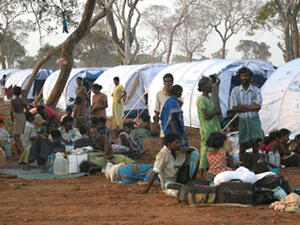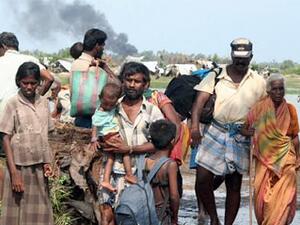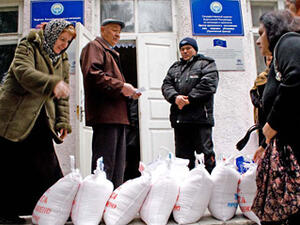High Commissioner expresses concern at outbreak of violence in Herat
High Commissioner expresses concern at outbreak of violence in Herat

Repatriating Afghan refugees wait at Iran's border town of Dogharon to cross into Herat in Afghanistan.
GENEVA, Sept. 13 (UNHCR) - High Commissioner Ruud Lubbers said today he is deeply concerned at the latest flare-up of violence that has prompted the UN refugee agency to suspend its operations in western Afghanistan for the second time in less than a month.
"This suspension comes at the worst possible time for Afghanistan, when increasing numbers of refugees are coming back to their homeland, and just a few weeks ahead of an election that will shape the future of the country," Lubbers said. "It is crucial that U.N. staff be allowed to do their very important work at such a vital juncture. This process must take place in safety: it is intolerable that anyone's life should be endangered."
Several hundred Afghan protesters attacked UN offices in Herat on Sunday after President Hamid Karzai announced that Herat's governor, Ismael Khan, was being moved to a minister post in the Afghan capital, Kabul. The protesters entered the UNHCR compound, looted its offices and damaged vehicles.
No UNHCR staff were hurt in the assault. About 10 of them hid in a bunker in the compound until teams from the U.S.-led civil military reconstruction office came to the rescue hours later.
The office of the UN Mission in Afghanistan was also attacked and set ablaze but UN security forces rescued its staff. News reports later said at least seven Afghans were killed in the violence in Herat.
UN Secretary General, Kofi Annan, condemned the attacks as "perpetrated by a tiny group who tries to undermine the Government's efforts to restore security and stability in this part of the country."
UNHCR is relocating its personnel out of Herat. All UNHCR activities in western Afghanistan have been suspended, including the daily convoys for Afghan refugees in Iran who wish to repatriate.
More than a thousand Afghan refugees who were on their way back from Iran are stranded at the border following the suspension of UNHCR voluntary repatriation convoys. Around 1,000 are staying in a refugee camp, the rest are waiting in emergency shelter for the convoys to start crossing the border again.
More than one million refugees have returned from Iran to Afghanistan since the beginning of UNHCR voluntary repatriation programme in April 2002 - up to 3,000 people a day in recent weeks. Herat is the first port of call within Afghanistan for refugees returning from Iran, and the recent instability in the region has delayed their travel on several occasions in the past few weeks.
In August, UNHCR had to suspend its convoys from Iran for several days because of fighting around Herat between Khan's supporters and troops loyal to a rival regional warlord. In the longer-term, UNHCR is concerned that continued instability could jeopardise the chances of Afghan refugees still in Iran who wish to return home with UNHCR assistance.
More than 3.6 million Afghan refugees have returned home - mainly from Iran and Pakistan - since early 2002.









